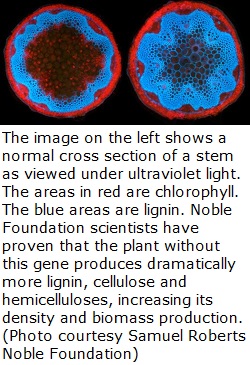 Researchers in Oklahoma have discovered the gene responsible for how dense of material a plant grows, and that discovery could open the door to more biomass for biofuels grown in the same amount of land.
Researchers in Oklahoma have discovered the gene responsible for how dense of material a plant grows, and that discovery could open the door to more biomass for biofuels grown in the same amount of land.
This press release from the Samuel Roberts Noble Foundation says making denser plants allows farmers to increase the amount of biomass without increasing their agricultural footprint:
“This is a significant breakthrough for those developing improved plants to address pressing societal needs,” said Richard Dixon, D. Phil., director of the Noble Foundation’s Plant Biology Division. “This discovery opens up new possibilities for harnessing and increasing the potential of crops by expanding their ranges of use. These plants will be part of the next generation of agriculture which not only impacts food, but many other vital industries as well.”
Huanzhong Wang, Ph.D., a postdoctoral fellow in Dixon’s lab, found a gene that controls the production of lignin in the central portions of the stems of Arabidopsis and Medicago truncatula, species commonly used as models for the study of plant genetic processes. Lignin is a compound that helps provide strength to plant cell walls, basically giving the plant the ability to stand upright. When the newly discovered gene is removed, there is a dramatic increase in the production of biomass, including lignin, throughout the stem.
Research targeting plants that are grazed by animals has historically focused on reducing lignin production within the plant. However, increasing lignin in non-food crops, such as switchgrass, may be desirable for increasing the density of the biomass and producing more feedstock per plant and, therefore, more per acre.
“In switchgrass, as the plant matures, the stem becomes hollow like bamboo,” Dixon said. “Imagine if you use this discovery to fill that hollow portion with lignin. The potential increase in biomass in these new plants could be dramatic. This technology could make plants better suited to serve as renewable energy sources or as renewable feedstocks to produce advanced composite materials that consumers depend on every day.”
Research with the University of Georgia has also shown that removing that gene can increase the cellulosic ethanol and butanol potentials of a plant. Officials say the overall discovery is a significant breakthrough that will help redefine the research.

